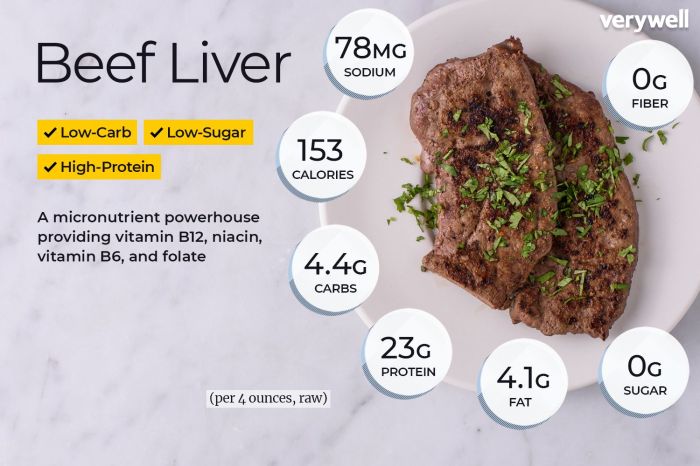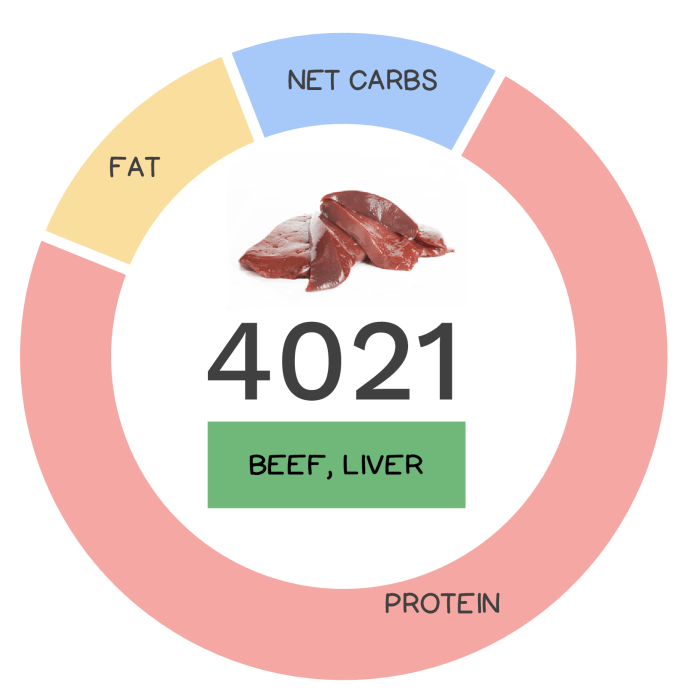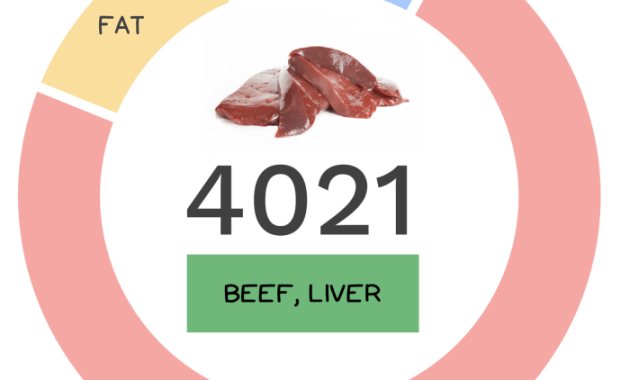Nutritional Profile of Beef Liver
Beef liver nutrition facts – Beef liver is a nutritional powerhouse, often overlooked in modern diets. Its rich, dark color hints at the concentrated vitamins and minerals packed within. While its strong flavor might not appeal to everyone, understanding its nutritional benefits can make it a compelling addition to a healthy eating plan. This section will delve into the detailed nutritional breakdown of beef liver, comparing its nutrient density to other popular protein sources.
Macronutrient Composition of Beef Liver
Beef liver provides a significant amount of protein, essential for building and repairing tissues. It also contains moderate amounts of fat and minimal carbohydrates. The exact macronutrient profile varies slightly depending on the animal’s diet and age, but a general guideline for a 100g serving is presented below. Note that these values are approximate and may vary slightly depending on the source.
| Nutrient | Amount per 100g | % Daily Value (DV)* | Notes |
|---|---|---|---|
| Protein | 27g | ~54% | High-quality protein, containing all essential amino acids. |
| Fat | 5g | ~7% | Primarily unsaturated fats, contributing to heart health. |
| Carbohydrates | <1g | ~0% | Negligible carbohydrate content. |
Percent Daily Value (%DV) is based on a 2,000 calorie diet. Your daily values may be higher or lower depending on your calorie needs.
Micronutrient Profile of Beef Liver: Vitamins and Minerals
The true nutritional star of beef liver lies in its exceptionally high concentration of vitamins and minerals. This makes it a particularly valuable food for those seeking to supplement their diet with essential micronutrients. The bioavailability of these nutrients is also noteworthy.
| Nutrient | Amount per 100g | % Daily Value (DV)* | Bioavailability Notes |
|---|---|---|---|
| Vitamin A (Retinol) | 10,000-15,000 IU | 100-150% | Excellent bioavailability, readily absorbed by the body. Preformed Vitamin A. |
| Vitamin B12 | 70-80 µg | 280-320% | High bioavailability; crucial for nerve function and red blood cell production. |
| Iron | 6-8 mg | 33-44% | Heme iron, which is more readily absorbed than non-heme iron found in plant-based foods. |
| Copper | 1-2 mg | 50-100% | Important for iron metabolism and red blood cell formation. |
| Vitamin B6 (Pyridoxine) | 1-2 mg | 50-100% | Essential for protein metabolism and brain function. |
| Selenium | 20-30 µg | 18-27% | Powerful antioxidant that protects cells from damage. |
Percent Daily Value (%DV) is based on a 2,000 calorie diet. Your daily values may be higher or lower depending on your calorie needs.
Beef liver boasts impressive nutritional benefits, packing a powerful punch of vitamins A and B12. However, for a balanced diet, consider the carbohydrate component; understanding the nutritional breakdown of your sides is crucial, like checking out the corn tortilla nutrition facts if you’re pairing your liver with tacos. This helps you create a well-rounded meal plan that maximizes the benefits of beef liver while managing overall caloric intake.
Nutrient Density Comparison: Beef Liver vs. Other Protein Sources
Beef liver significantly surpasses many other common protein sources in terms of nutrient density. While chicken breast and lean ground beef are excellent sources of protein, they lack the concentrated array of vitamins and minerals found in beef liver. For example, a 100g serving of chicken breast offers significantly less Vitamin A, Vitamin B12, and iron than the same serving of beef liver.
Similarly, lean ground beef provides less Vitamin A and B12. This high concentration of micronutrients makes beef liver a unique and valuable addition to a well-rounded diet. However, it’s important to consume beef liver in moderation due to its high vitamin A content.
Health Benefits of Beef Liver Consumption

Beef liver, often overlooked, is a nutritional powerhouse boasting a remarkable array of vitamins and minerals that contribute significantly to overall health and well-being. Its unique composition offers a range of potential benefits, impacting various bodily functions from blood health to energy levels. Let’s delve into the specific ways beef liver can positively influence your health.
Beef Liver and Healthy Blood Levels
Beef liver’s high concentration of vitamin B12, folate, and iron plays a crucial role in maintaining healthy blood levels. Vitamin B12 is essential for the production of red blood cells, preventing anemia. Folate, another B vitamin, assists in the formation of red blood cells and helps prevent neural tube defects. Iron, a vital component of hemoglobin, is responsible for carrying oxygen throughout the body.
A deficiency in any of these nutrients can lead to fatigue, weakness, and other health complications. Regular consumption of beef liver can help ensure adequate intake of these essential nutrients, contributing to healthy red blood cell production and overall blood health.
Beef Liver’s Support of Immune Function, Beef liver nutrition facts
Beef liver’s impressive nutritional profile extends to its significant contribution to immune function. It’s a rich source of vitamin A, a potent antioxidant that supports the integrity of mucous membranes, acting as a first line of defense against infection. Furthermore, the various B vitamins present in beef liver are crucial for the proper functioning of the immune system’s cells.
These vitamins are involved in numerous metabolic processes necessary for immune cell development, activation, and function. Copper, another nutrient abundant in beef liver, plays a vital role in immune cell activity and the production of white blood cells, which are crucial for fighting off infections.
Beef Liver and Improved Energy Levels
Feeling consistently fatigued? Beef liver might be your answer. The high concentration of B vitamins, particularly B12 and B6, are directly involved in energy production within cells. These vitamins are crucial co-factors in various metabolic pathways that convert food into usable energy. Iron, abundant in beef liver, also contributes to energy levels by ensuring efficient oxygen transport throughout the body.
Adequate iron levels prevent fatigue associated with anemia, resulting in improved stamina and overall energy. Therefore, incorporating beef liver into your diet can help combat fatigue and enhance your energy levels naturally.
Beef Liver and Eye Health
Beef liver’s benefits extend to eye health, primarily due to its significant vitamin A content. Vitamin A is a precursor to rhodopsin, a pigment essential for night vision. A deficiency in vitamin A can lead to night blindness and other vision problems. Furthermore, vitamin A plays a vital role in maintaining the health of the cornea and conjunctiva, the protective outer layers of the eye.
The antioxidants in beef liver also help protect the eyes from damage caused by free radicals, reducing the risk of age-related macular degeneration and cataracts. Therefore, regular consumption of beef liver can contribute to maintaining healthy vision throughout life.
Visual Representation of Beef Liver Nutrition: Beef Liver Nutrition Facts

Beef liver, a powerhouse of nutrients, often presents a challenge to the uninitiated due to its unique appearance. Understanding its nutritional profile, however, requires not only knowledge of the facts but also a clear visualization of how these nutrients interact. This section will provide a descriptive account of beef liver’s appearance and a textual representation of its key nutritional components.Beef liver’s appearance is distinctive.
Its color is a deep, rich reddish-brown, almost burgundy in some cases. The surface is usually slightly mottled, with variations in shade. The texture is firm but not tough; it’s somewhat dense and moist, with a slightly grainy feel. Imagine a dark, moist sponge, slightly heavier than expected, with subtle color variations across its surface. Raw beef liver has a characteristic slightly metallic scent that some find appealing, while others find less pleasant.
Once cooked, this scent typically mellows, and the texture becomes more tender, though still retains a certain firmness.
Textual Representation of Beef Liver’s Nutritional Composition
Let’s imagine a pie chart representing the major nutrients in a 3-ounce serving of beef liver. The largest slice, occupying approximately 40% of the chart, would represent protein. This signifies the high protein content, crucial for building and repairing tissues. The next largest slice, about 25%, would be dedicated to vitamin A, highlighting its exceptional richness in this essential nutrient.
A smaller, but still significant, 15% slice would showcase iron, emphasizing its contribution to red blood cell production and oxygen transport. The remaining 20% would be divided among other vital nutrients such as vitamin B12, folate, and various other minerals. Each of these smaller segments, though individually smaller than the major components, contribute significantly to the overall nutritional value, illustrating the comprehensive nutritional profile of beef liver.
Think of it as a vibrant pie chart, where each slice, large or small, plays a critical role in providing a well-rounded nutritional package.
Detailed FAQs
Is beef liver safe for pregnant women?
Pregnant women should limit beef liver consumption due to its high Vitamin A content. Excessive Vitamin A can be harmful to a developing fetus. Consult a doctor for guidance.
Can I eat beef liver every day?
No, daily consumption of beef liver is not recommended due to its high cholesterol and Vitamin A content. Moderation is key.
How can I reduce the strong taste of beef liver?
Soaking beef liver in milk or buttermilk for a few hours before cooking can help to tenderize it and reduce the strong flavor.
Does beef liver contain purines?
Yes, beef liver is relatively high in purines. Individuals with gout should consume it in moderation.

